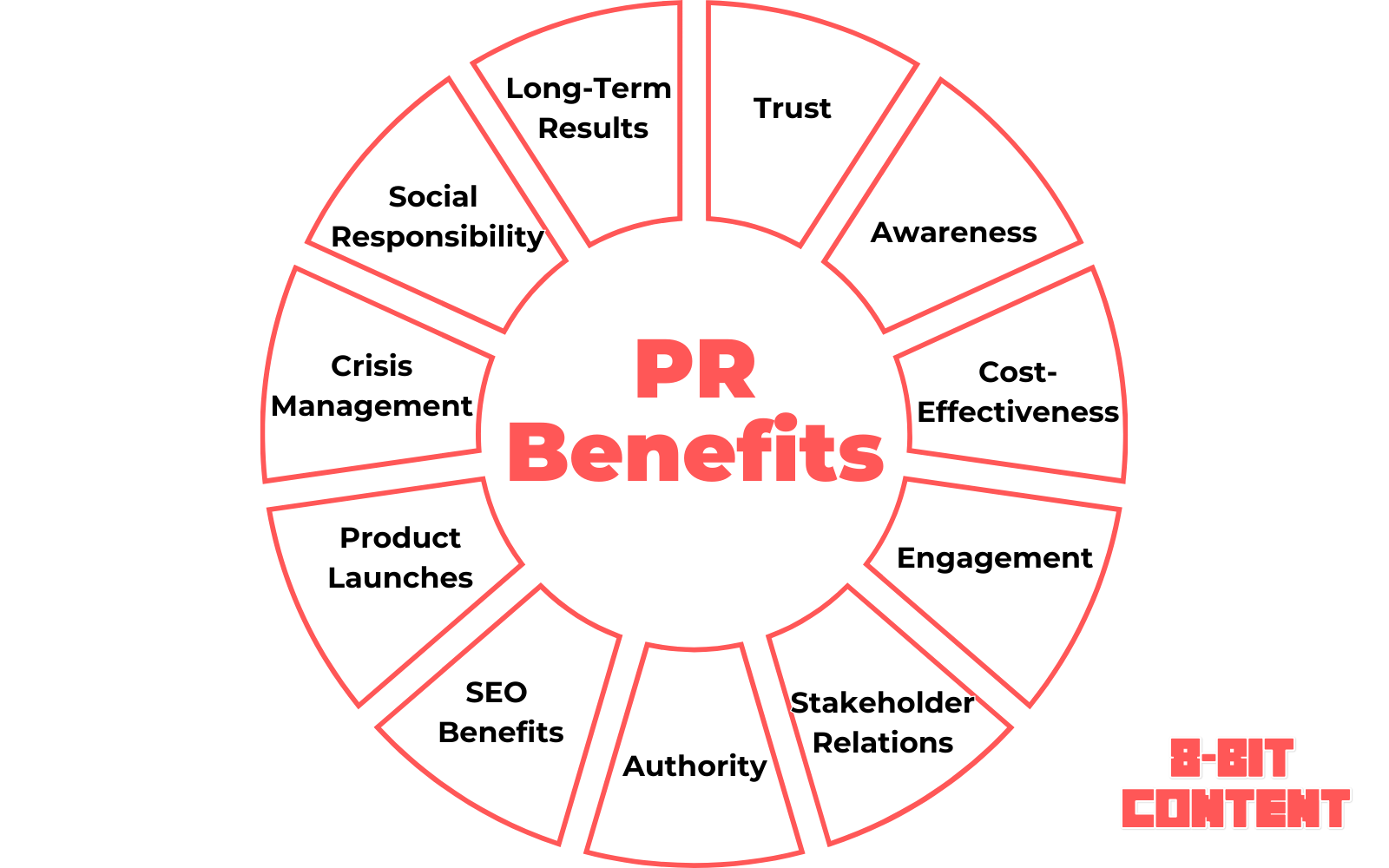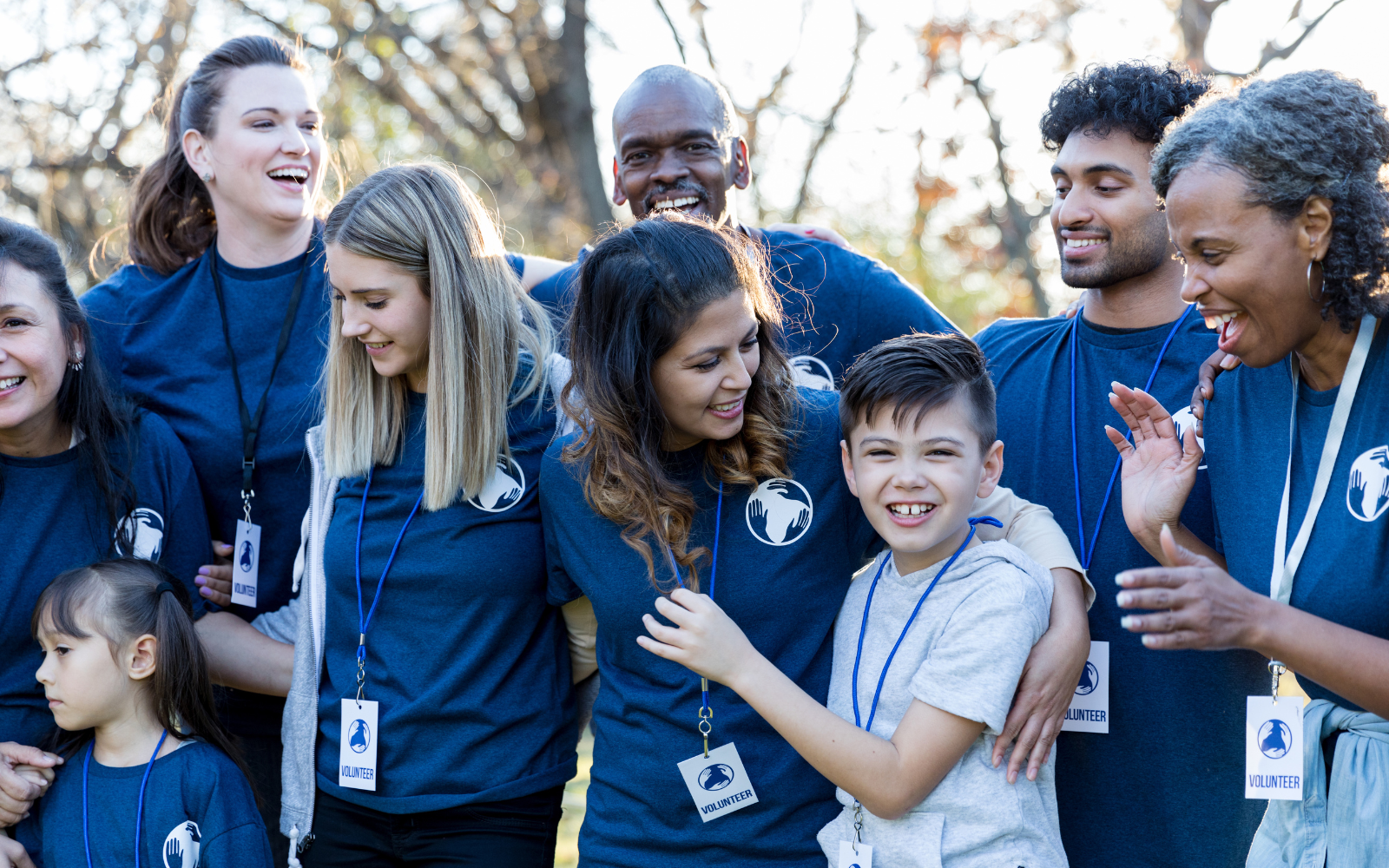11 Key Advantages of Public Relations
Are you curious about the advantages of public relations and whether or not your company could benefit from more investment in it?
We've helped companies improve their sales via public relations, so we decided to jot down some of our findings.
In this friendly guide, we'll demystify PR, list its biggest perks and pitfalls, and reveal why it's a game changer for companies and the people they serve.

What is Public Relations?
Public Relations, or PR, is all about shaping the public's view of a company, person, or product.
It's a way for businesses to create a positive brand image with their target market.
As the old saying goes: people do business with those they know, like, and trust.
And PR allows you to nurture this at scale.
PR pros use lots of effective tools to accomplish public relations strategy.
Historically, this would involve creating news stories, planning events, talking to the media, or handling difficult situations that might damage their client's positive image.
This often holds true today, but depending on the business, you may also want to work with a carefully curated list of micro-influencer to enjoy similar results.
In the end, the goal is to make the public like and trust your business.
You want people to see your business in a certain way, whether those people are customers, investors, or other important groups. And this is what PR does.
Main Advantages of Public Relations
Public relations has many key benefits that help all aspects of a business. Here are 11 examples:

Credibility & Trust
Arguably the most important benefit of Public Relations is how it can help foster trust in target audiences.
PR activities often carry more credibility than traditional advertising messages as they leverage third-party endorsements from an objective source like media coverage or word-of-mouth.
You know how you're more likely to believe something when you hear it from a friend instead of from a billboard or TV ad?
That's exactly what PR does. It gets information about you to the public, not through ads, but through other people, like journalists or influencers, who your target audience already trusts.
It's like having a friend vouch for you, which makes people more likely to believe in and support you.
Brand Awareness
A successful public relations campaign can significantly increase brand visibility and recognition by getting your name in various media outlets.
The more people see and hear your name, the more they remember it.
And so when it comes time to need your product or service, your brand will be top of mind!
Cost-Effectiveness
Compared to advertising, PR campaigns can be less expensive and more cost-effective, especially when it comes to earned media such as press coverage.
Instead of shouting about yourself with a loudspeaker, it's like getting other people to talk about how great you are.
For example, maybe a newspaper writes a story about your business, or a popular blogger mentions you in their post. This kind of attention is what we call 'earned media'.
And this is where micro-influencers can get a particularly juicy ROI. Their audience isn't big enough to demand a big investment, but the audience they DO have is also likely more engaged and trusting of their word than, say, a big influencer with a long history of brand partnerships.
Ideally, you'll partner with someone on the rise - someone who is gaining popularity but still willing to partner in return for a free product.
We used this strategy to great success using simple but effective email outreach for a client in the smart office niche:

Audience Engagement
PR fosters a deeper level of engagement with the audience, using storytelling and informative content marketing to create a connection (and as you'll see it's helpful for both SEO and content marketing).
Let's say your company sells hiking boots. Instead of a marketing strategy centered around a message like: "Buy our boots; they're the best," you tell a story.
You might share a blog post about an amazing mountain adventure someone had wearing your boots. Or you create a video interview with a famous hiker who loves your product.
This kind of storytelling isn't just interesting and gets your audience involved. They can imagine themselves in the story or learn something new from it and maybe likelier to share it with their network.
They're invested in a story, not just listening to a sales pitch.
And because they're engaged, they're more likely to remember your brand and feel a connection to it.
It's like how you'd feel closer to someone you've had a great conversation with compared to someone who talks at you.
So, PR helps to create these deeper, more engaging conversations with your audience, which can help build a stronger connection between them and your brand.
Stakeholder Relations
Public Relations (PR) is like being a good host at a big party.
Just like a host ensures all guests - friends, family, neighbors - are happy and involved, PR keeps all the people essential to your business (we call these 'stakeholders') connected and satisfied.
These stakeholders are not just your customers but also your employees, those who invest money in your business, and the community around you.
For example, a communications strategy might share positive stories about your company to make customers want to buy from you.
For employees, PR might share news and updates to make them feel part of the team.
PR might share business growth and successes with investors to show them their investment is doing well.
And for the community, PR might show how your business is involved in local events or charity work.
In all these ways, PR helps to build and maintain a strong relationship with all the people that matter to your business.
Just like a good host makes sure everyone at the party feels welcome and involved.

Industry Authority
You can also think of Public Relations (PR) as a cheerleader who helps you stand out in a crowd.
Imagine you're at a large event, and everyone there is an expert in their field, just like you. But how do you show everyone that you're not just part of the crowd but a leader?
That's where PR comes in. They arrange for you to do things that highlight your knowledge and experience. This could be giving a talk at a big conference, writing an article in a well-known magazine, or even winning awards in your industry.
When you do these things, people start to notice. They see you're not just another face in the crowd but someone who knows their stuff. They start to see you as a 'thought leader' - a leading authority in their field.
So, PR is like your cheerleader, helping you stand out and get noticed as a leader in your industry. It's all about making sure people see and recognize your expertise.
And you can further this by expanding out the content on your website to showcase your knowledge.
This is one of the best strategic communications tools you have as you own it, and it expands your authority and your opportunities to rank for relevant topics in Google.
SEO Benefits
It may help to think of the internet as a big city; and your website is your home in this city.
Suppose you could put up signs around the city that lead people back to your home. The more signs you have, the more people will likely find your home. For websites, these 'signs' are called 'links'.
Public Relations (PR) can help you put up these 'signs' to help get your blog noticed. This could be by sending out online news releases about your business, writing guest posts for other blogs, or getting other business owners to mention you on their websites. Each of these activities can create a link back to your website.
And here's why this is important: Search engines like Google are like the mapmakers of our internet city. They decide which homes (websites) are easiest to find. One of the ways they do this is by looking at how many 'signs' (links) lead to your home (website).
The more high-quality links you have, the more likely Google is to trust that your website is important and worth showing to people.
So, PR activities can help improve your website's visibility on search engines by creating more high-quality links pointing back to your site. It's like putting up more signs around the city to help people find their way to your home.
Product Launches

Let's say you have a new product release launching on Product Hunt. You know it's great, but how do you get others as excited about it as you are?
This is where Public Relations (PR) comes in. PR is like your very own hype machine. It helps drum up excitement and interest before your new product gets released.
PR might send news stories about it on related websites or email newsletters or organize a contest event where people refer their friends to vote in return for a free trial. You might even get influencers to post about it on their social media.
All of this buzz makes people curious and excited about your new product. By the time it's available to buy, people can't wait to try it. This excitement can help your product launch be a big success.
So, PR is a powerful tool for creating a buzz around new products, getting people excited and eager to try them out. It's like having a hype machine that makes your product launch an event people don't want to miss!
Crisis Management
Sometimes, unexpected problems can happen in a business. It could be a pricing increase, a negative news story, or even a social media mishap. When something like this happens, a wave of bad publicity can hit your business.
That's when your PR can make or break your reputation over time. They're trained to handle these storms. They know what, when, and how to convey key messages to the public.
They typically release a statement or even set up a meeting with the people affected by the problem.
Their main goal is to protect your business's positive brand reputation. They work to prevent the storm from causing too much damage and to fix things as quickly and smoothly as possible.
So, in times of trouble, PR professionals act as crisis managers, helping weather the storm and rebuild its aftermath.
Social Responsibility

PR can help showcase your corporate social responsibility efforts in a tasteful way that helps build a strong reputation as a company that gives back to the community.
If your company does something good, like helping the community, you want people to know about it. PR shines a spotlight on these good deeds.
Let's say your company donates a portion of its profits to a local school, or your employees spend a day cleaning up a park.
These actions show that your company goals account for more than just making money, but also social responsibility.
PR helps to show these efforts to the world. They might write a news release about your donation or share photos of your park clean-up on social media. They make sure people see your good deeds.
This can enhance your reputation. People like companies that do good and are more likely to support them. So, by spotlighting your good deeds, PR can help you be seen as a company that cares about its community.
Long-Term Results
The benefits of a successful PR campaign can be felt long after the campaign ends through sustained brand recognition and reputation.
Think of it like planting a tree.
When you first plant a seed, it may not look like much. But over time, it grows into a large, strong tree.
A PR campaign is like planting that seed. At first, you might send out press releases, organize events, or do media interviews.
This might give you some immediate attention, which is great. But the real magic happens over time.
As your PR efforts continue, your brand name gets seen and heard more and more. People start to recognize and remember you. They might even consider you a trusted and credible choice in your field. And once people perceive your brand positively, it tends to stick around - just like a fully grown tree.
Even after your PR campaign ends, the benefits keep going. People remember your name, trust your brand, and afford you a competitive advantage. This long-term recognition and positive reputation are one of the most valuable benefits of PR.
So, even though it might take time to grow, once it does, it can provide shade and benefits for a long time.

What Are Some Disadvantages of Public Relations?
Of course, people are complex, so there are always disadvantages that may come with PR as a form of promotion for marketing campaigns.
Lack of Control
Unlike advertising, where you have full control over the message and placement, in PR, if you choose the traditional route, the media outlet largely determines the final content, timing, and presentation.
There's also the risk that the message might be misunderstood or misconstrued by the audience, potentially harming the organization's image.
Slow Results
PR often requires a long-term commitment, and it may take time to see measurable results. It's more of a marathon than a sprint.
As mentioned above, with the analogy of planting a tree, PR is about building relationships and trust, which takes time. You must consistently show that you're reliable, interesting, and valuable. It's not about one big splash but many small ripples over time.
And just like growing a tree, there are no guarantees. You can do everything right, but sometimes, things just don't grow as expected. That's why PR requires a long-term commitment. You must be patient, keep working, and trust that your efforts will eventually bloom.
So, yes, it might take time, and there's no guaranteed outcome, but with patience and consistency, you will more likely cultivate something beautiful and fruitful.
FAQ of Public Relations Benefits
Here are some answers to questions people tend to have about PR.
What are the Advantages of an In-House Public Relations Department?
An in-house PR team offers key advantages. They fully grasp your company's essence, allowing for genuine communication.
They can respond instantly to any crisis or opportunity, minimizing delays. Their constant involvement ensures a consistent brand voice across all PR activities.
And despite staff costs, they can be more cost-effective in the long run compared to external agency fees. They can also help align PR strategies with your business goals to sustain lasting relationships with media and stakeholders.
What are the Advantages of Working with an External Public Relations Team?
An external PR agency, similar to outsourcing copywriting, can bring a fresh perspective and inject your strategies with new ideas.
They have a crew of specialists, experienced in various PR areas, and can offer their established media relations for better publicity. They can scale up quickly for larger projects and save your internal team's time for other tasks.
You can also manage your expenses by adjusting their services as needed. They are like skilled tour guides, providing novel insights, expertise, and flexible support when needed.
What are the Advantages of Public Participation?
Public participation that results from PR campaigns has multiple benefits.
It enriches decision-making with diverse perspectives and insights, builds trust in organizations by valuing public views, and strengthens the bond between the organization and the community.
Decisions shaped with public input gain legitimacy and are more readily accepted, facilitating successful implementation. The process allows mutual learning between the public and the organization and empowers citizens by giving them a say in decisions impacting their lives.
Think of it like a group project, fostering collaboration, respect, and empowerment.

Key Takeaways
- What's PR? It's like a friendship-maker between your business and the world. It's all about creating and keeping good relationships.
- The Good Stuff about PR: It helps people trust you, gets your name out there, saves you money on ads, grabs attention, builds strong bonds with everyone involved in your business, makes you a leader in your field, boosts your online visibility, creates excitement around new products, helps you handle bad times, highlights your good deeds, and leaves a good and lasting impression.
- The Not-So-Good Stuff about PR: You'll need to stick with it for a while, and since you can't control everything, there are no sure-fire wins, especially if you go in blind.
- Your Own PR Team: They know your company inside-out, can react super-fast, keep your message steady, could save you money in the long run, make sure PR goals match business goals and build long-term relationships.
- Hiring a PR Agency: They bring fresh ideas, have specialists for different tasks, already have connections with the media, can offer extra help when needed, free up your time, and let you control costs by choosing what services you need.
- People Power: When people get involved in decisions, those decisions get better. It also builds trust, improves relationships, gives decisions more respect, ensures new plans work well, helps both sides learn, and gives people a sense of power.
In the end, PR is a "win-win", much like a great friendship: your company meets its goals, gets a good name, and builds strong bonds, while your target audience sees your company as open, responsible, and responsive.
It's like a two-way street where understanding and working together benefit everyone.
And if you'd like to get some help, don't hesitate to connect with us and tell us your needs!
Blog
Let’s grow your online visibility together!
Join our newsletter for actionable tips and checklists!
Contact Us
You can also find us here:




